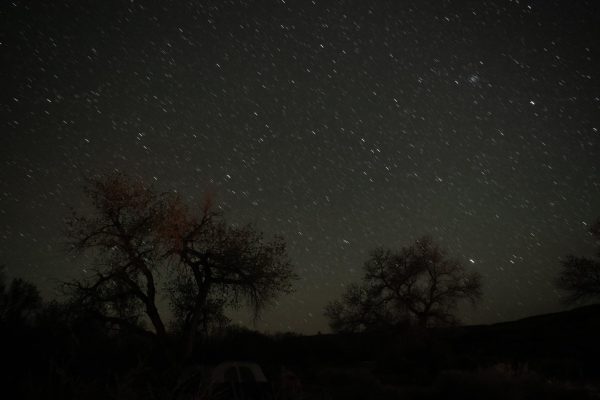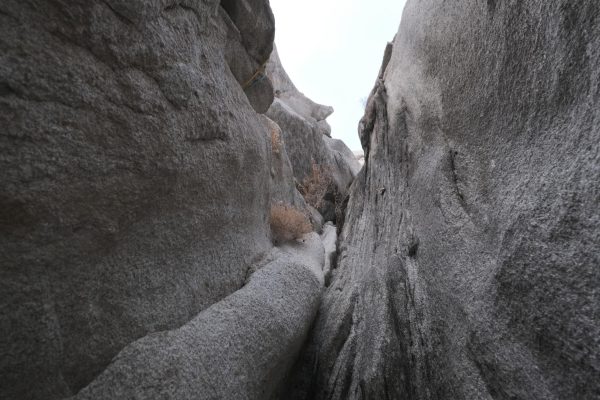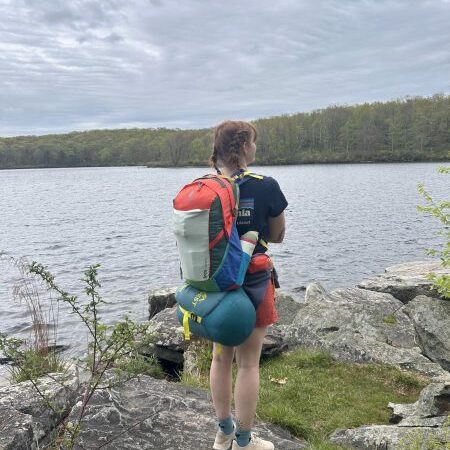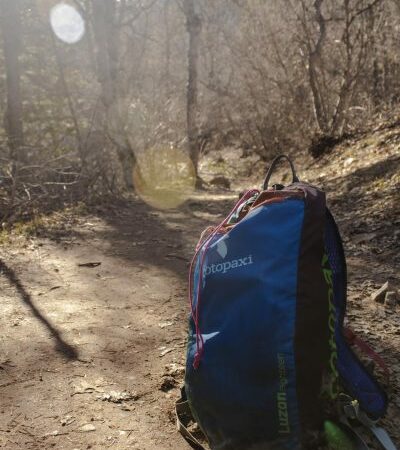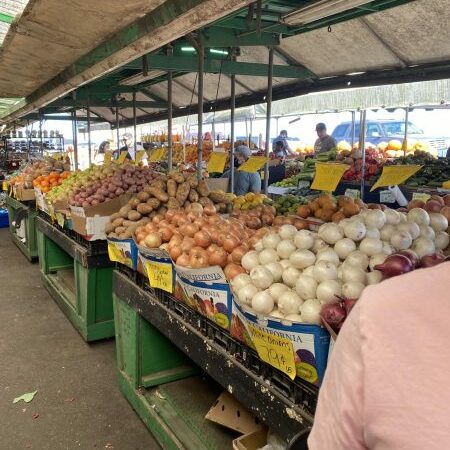Hitchhiking in Peru
I never would have imagined myself finishing off 2022 by catching rides from strangers in South America and sleeping in the back of semi-trucks. In fact, if you would’ve told me a couple of years ago I would conclude my semester abroad hitchhiking up Peru’s coast for a week with someone I had met only a few months earlier, I would’ve probably doubted your sanity. And yet, somehow by the time one of my friends invited me to join him on an unconventional trek north at the end of last November, saying yes felt like the most natural thing in the world.
The two of us met at the tail end of August 2022, crossing paths in Peru after both signing up to study abroad in Cusco through a program called ISA (International Studies Abroad). Instead of electing a University of Utah faculty-led program, I opted to travel to Peru through an affiliate organization, one which would allow me to live with a host family, take classes from local Peruvians, and go on a variety of included excursions. The instant I found ISA’s program, I knew it was precisely the kind of experience I hoped to have, and in all honesty, I now consider the final four months of 2022 to be some of the most overwhelmingly beautiful, growth-promoting, and happy months of my life.
After spending my fall semester studying Peruvian culture in Spanish, making important friendships, climbing in the Sacred Valley, and backpacking through Peru’s arid mountains and dense jungle, I found myself itching for more. It seemed the more rocks I climbed and the more ruins I wandered, the more intensely I longed to continue exploring. Something about the natural world tugged and pulled at me, and I just couldn’t resist its gravity.
Prior to leaving Utah, I intentionally booked my return flight a week after the semester concluded to allot myself extra time to travel independently. But here I was, with only a few days of classes remaining and no formal plans made. I had thrown around a couple of ideas with different friends, but nothing sat right in my stomach; I just wasn’t sure what kind of experience I wanted to have during my last week. But, when Kele mentioned he would love to have me join him for part of his hitchhiking trip from Cusco to Venezuela, something felt different. Bigger and more meaningful. The adventure he proposed wouldn’t be easy, small, or effortless, but would instead entail uncomfortable firsts and a multiplicity of unknowns. There was something about the hugeness of the task that, though admittedly intimidating, was undeniably enticing; I couldn’t say no.
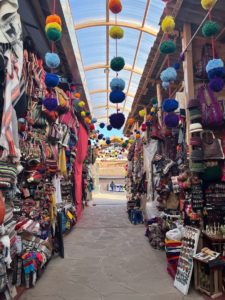
In this moment of decision, I was reminded of an important truth I’d learned while reading Alastair Humphreys’ book, Grand Adventures (a great read if you want to change how you think of traveling). Humphreys reminded me repeatedly that the most important step in doing something monumental after telling everyone you want to do it, is committing to it: quit your job, buy the flight, make shit happen! A couple of days later, I changed my flight to depart from Lima instead of Cusco, and then suddenly, it was settled: I had a plane to catch in a week and was 800 miles away; we needed to get moving.
On the morning of December 3rd, I bid my host family farewell, slung my backpack over my shoulders, and made my way to downtown Cusco with Kele. Despite feeling liberated in those first few minutes because everything I needed for the next week was on my back, I was also quite intimidated. I had never hitchhiked before and silently wondered how much of our trip might be spent walking. How difficult would it be to catch a ride? Was hitchhiking all the way to Lima even realistic? I had packed minimally but was all too aware of my bag’s weight and the intensity of the midday sun. I wondered if this trip was something someone like me could even do.
After taking a bus for 40 cents to get out of the city, we found ourselves standing on highway 3S, cars whizzing past us at dishearteningly fast rates. This was where the hitchhiking would begin. It was a big highway, and I was nervous at the prospect of trying to wave someone down. Despite some initial rejections, to my surprise, after only about five minutes, a pickup truck stopped. After mentioning we were headed to Limatambo, a city about 79 km west, the driver hopped out and motioned for us to throw our packs in the back. Upon climbing in, I couldn’t suppress the grin sliding its way across my face. I was in the middle of Peru, sitting in the pickup of a stranger and headed on an adventure with one of my best friends beside me. I could hardly believe this life was mine.
After about an hour and a half, we arrived in Limatambo, a small but busy town. After less than ten minutes, another driver stopped, kindly telling us to make ourselves comfortable amid an odd assortment of produce in the back of his truck. I sat on a bag of onions and stared out the back window, enjoying a new view of the Andes with each tight turn we took through the mountains. Roberto drove us 45 km before dropping us in Curahuasi, where catching a ride proved more difficult.
We attempted to flag people down for over an hour, but to no avail. Everyone laughed or simply smiled and shook their heads at the “crazy gringos” begging for a ride. It was dusty and hot, and we were
disheartened. We tried waiting at several different spots but got rejected repeatedly. We did our best to keep our spirits up but became pretty discouraged as it grew later in the day. Eventually, we began a slow and dusty walk out of town, before Kele wisely proposed we stand next to a speed bump. It was here, a place where drivers conveniently had to slow down anyways, where we met our miracle.
Roger pulled his semi truck to the side of the road before cranking down his window to speak with us. After asking where he was headed, we hardly believed our good fortune as the word “Lima” fell out of his mouth. We couldn’t help but cheer; Lima was roughly 1,000 kilometers and 16 hours away from Curahuasi, and yet we had found someone willing to pick us up!
Roger proved to be a miracle over and over again. In addition to pointing out parts of the landscape we missed, teaching us new words in Spanish, and buying us Chicha Morada to share at dinner, he also offered to let us sleep in the back of his empty semi-truck that night. We awoke to the rumble of the engine around 4:15 on Sunday morning, quickly rolled up our sleeping bags, and started driving into the dark that slowly turned to dawn. We spent hours stuck in standstill traffic together, chatting and laughing and staying silent much of the time too. Roger didn’t just share his truck and time with us, but his patience. In total, he drove us for a day and a half, helping us cover over 700 kilometers before dropping us off near Paracas around 9 pm.
Kele was drained from the trip, and I was not only exhausted, but incredibly sick, having thrown up while crapping myself just a few hours earlier. We decided to splurge on a $4 taxi ride to the beach where we camped for the night. Pictures had made us expect idyllic white sand and beautiful cliffs, but instead, we were greeted by a beach covered in trash, loud music, and the smell of piss. We were too tired to care, and simply collapsed into our sleeping bags before waking up coated in sand on Monday morning. We splurged again on a breakfast that wasn’t worth it, bought groceries, and realized neither of us remembered to bring a pan. We had food, fuel, and a stove, but nothing to cook in. We spent the next couple hours walking from shop to shop, restaurant to restaurant, asking if anyone had a pan they weren’t using. Eventually, a kind woman making arepas walked us over to her neighbors, Luz and Willy, who presented us with an old pot they could feasibly part with. It was rusty, with a lopsided screw hanging out the side instead of a handle, and it was perfect. We thanked our new friends profusely and headed on a hot and silent walk toward a better camping spot.
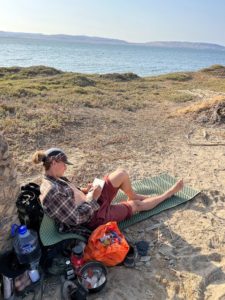
Eventually we crossed an empty lot and made our way to the water, opting to camp under a single palm tree in between several mansions sprawled down both sides of the beach. We wondered repeatedly whether someone would ask us to leave but were pleasantly surprised to remain undisturbed until the next afternoon, when one of our neighbors approached us. After asking what we were doing and where we were from, Herald offered to let us use his tent, telling us there were scorpions in the area. Upon retrieving it, he proceeded to set it up with us, ensuring we would be comfortable for the night and asking if we knew how to windsurf. After offering to teach us and leaving to arrange things, he returned, claiming he’d decided we’d be more comfortable staying in his guest house than on the beach. Thanks to Herald’s immense generosity, we spent the next three nights living in luxury. We enjoyed delicious meals for free with his family, learned how to windsurf, and made unexpected friendships, before leaving for Paracas on Friday morning.
After paying for a couple of taxis and deciding to spend $7 each on a three-hour bus ride, we finally arrived in Lima on the evening of Friday, December 9th, where we stayed at a hostel before I flew home to Utah.
Hitchhiking through Peru taught me innumerable things, the most important of which is that the success of our trip would’ve been entirely impossible without the kindness of others. I was consistently in awe of the many people (named and unnamed) willing to so generously help us in a time of need while expecting absolutely nothing in return. I asked Kele repeatedly what it was we could offer our friends to repay them or express gratitude. His response is a charge I’m determined to take to heart: the best way we can express appreciation for what we receive from strangers on the trail, is by extending that same generosity to those in need we encounter ourselves.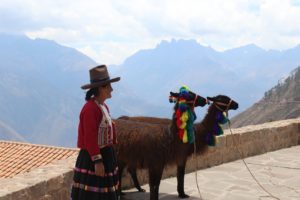
The post Hitchhiking in Peru appeared first on Wasatch Magazine.

